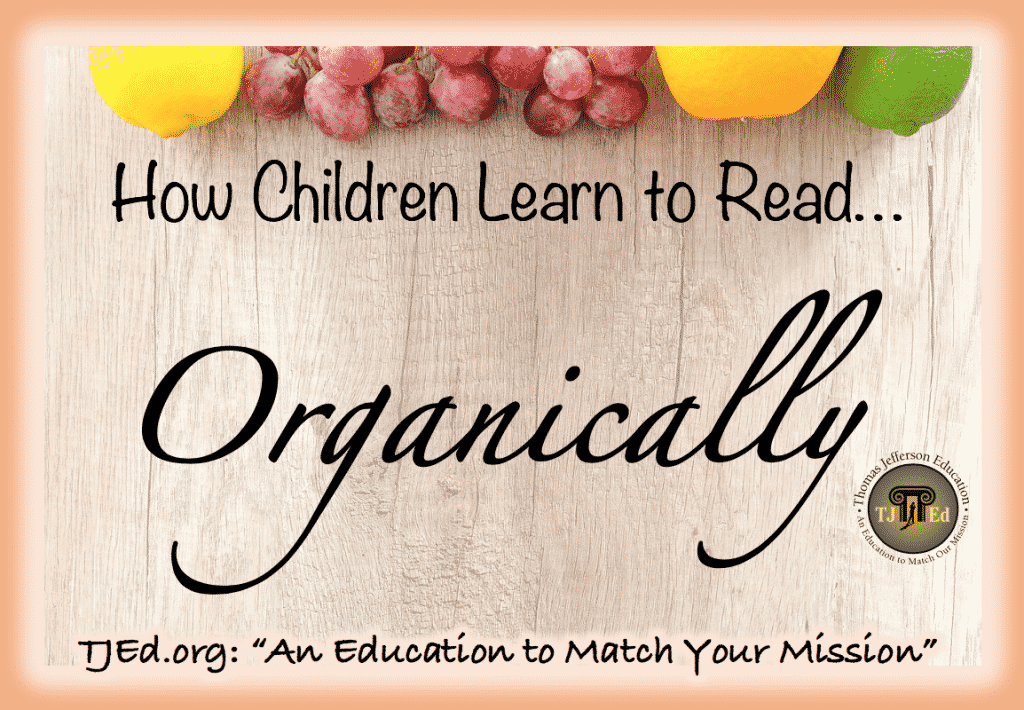
The Controlled Panic
One of the most common, and “urgent”, questions we hear from people new to (or contemplating) homeschool is “How do I teach my child to read???”
Note the three question marks. Yes, that’s how it sounds when they say it; there’s an emotional tug in that question that tells you a lot is hinging on the answer.
I have been homeschooling for going on thirty years, and my youngest is 14 as of the time of this post. I have two dyslexic children, one with profound developmental delays, two with dyscalculia, several who were precocious in one way or another, and all of whom have amazing gifts, talents, challenges and personalities! The two who took the ACT scored in the 30’s. The others who have reached adulthood are successful, effective and fulfilled in the families and professional life.
Why do I tell you all this? Because I just want to give some context for the ideas I’m about to share with you. I want you to know that I understand the context of learning challenges — including divergent learning styles and dealing with gifted and disabled children.
Here’s what they used to look like, circa 2006, with some updated images circa 2017:
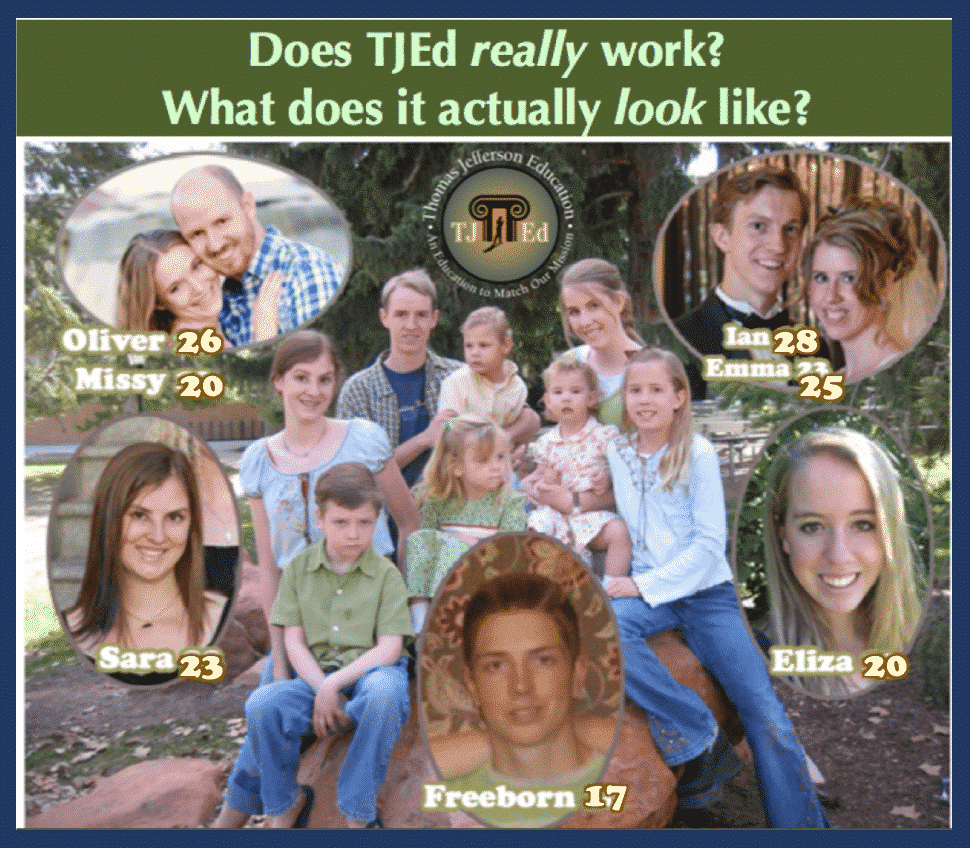
They’re all even older now, and we have lots of stories to tell about our experience with family learning!
If you subscribe to our newsletter [here] you’ll get more of that. I share my enthusiasm and confidence that children with a variety of learning styles, developmental trajectories, challenges and gifts can be successfully educated without ruining their self-esteem, your relationship with them or their will to learn without force. They really can!
No Excuses
But I have a specific purpose for this post. Considering the aforementioned panic that sometimes accompanies the question of ‘how children learn to read,’ I wanted to get beyond all the worried disclaimers people tend to give [“well, it’s easy for you, because…”, “but what if…?”, “my situation is different, so…”].
To do this I’m going to give you a broad cross-section of experience from people who aren’t me – who aren’t us.
This is a long post, and you can bug out at any time after you’ve gotten the point. But I’m hoping that the weight of so many witnesses with such varied situations and experiences will speak to you, and you’ll find some relevant examples to give you the specific insight that will help you most.
So here is the question I posted on Facebook…
READING ACQUISITION:
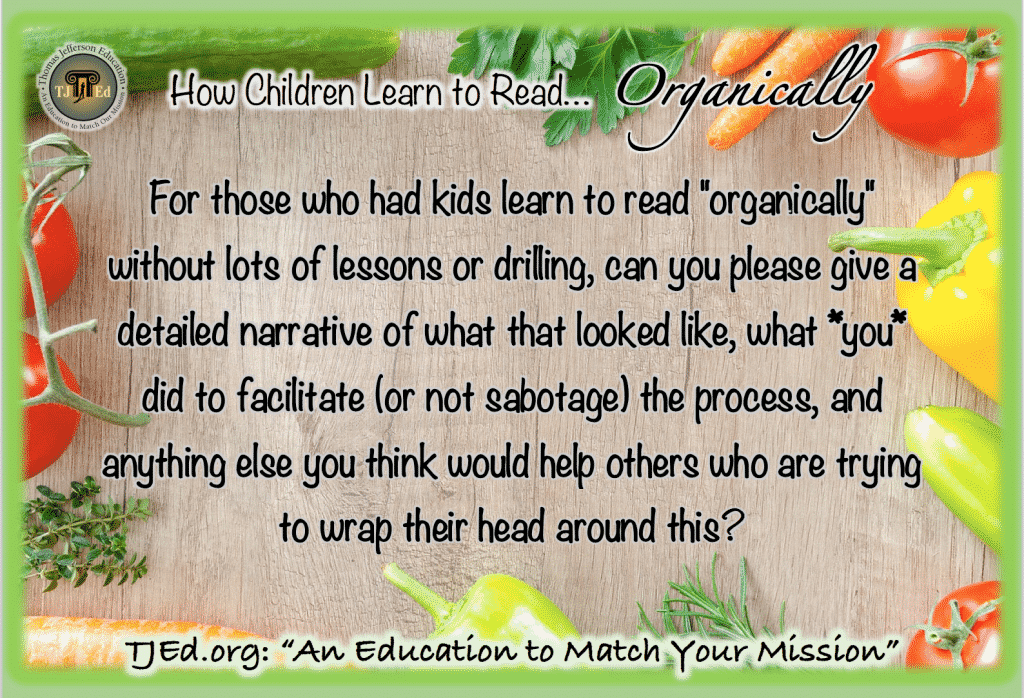
[For audible text: For those who had kids learn to read “organically” without lots of lessons or drilling, can you please give a detailed narrative of what that looked like, what *you* did to facilitate (or not sabotage) the process, and anything else you think would help others who are trying to wrap their head around this?]
Here are the responses:
These are loosely organized by type at first, and then just follow the order in which they were posted on the Facebook discussion.
Seeing others in the family reading made the biggest difference
EL: My 4th child never attended a public school at all and I was freaked about him learning to read. He turned 8 in June of this year. He began reading small words on his own about a year before that but if I tried to encourage a little more he would become slightly disinterested. I backed off. Every once in a while I would show him some tricks like how you could turn the word bat into cat by just changing one letter. My mom read with him one-on-one away from the other kids about 3 times. One day he came home from grandma’s and said he could read. He now reads small chapter books on his own almost every single night. I have extra copies of our family readaloud so that he can follow along. It really just happened once he became interested. I think the biggest key was him seeing me and the other kids read. He wanted to be like the older kids.
 Reading aloud; nighttime reading; library trips
Reading aloud; nighttime reading; library trips
KL: We have always done lots of reading aloud together, especially any books the kids asked me to read with them. When they started noticing letter sounds in the words, I asked them to read just a few words of the story as I pointed to them. When they started to slow down or show any tiny sign of frustration, I read the rest of the story to them. They “caught” me and my husband reading, and later older siblings, just for fun. They could see that reading is something older people do for fun and to learn new things. They have reading time every night from 7pm to 8pm before lights out. They may not play with toys or lights-out comes early. This has incentivized the older siblings to read to their younger siblings, strengthening the reading habit in all of them. As they come to my husband and I with their first personal goals, (“I’m going to read this whole book!”) we offer encouragement. As they accomplish those goals, (“Mom, I just read these three I Can Read It books!”) we offer rewards of new books just for them. Ownership and achievement make reading even better for my kids. We also have a graduation party as soon as our kids start setting their own reading goals and sticking to them. We call it graduation because they are going from Core phase into Love of Learning phase. We make this party a big deal and include extended family with all kinds of treats, like Book Worms (gummy worms) and graduation caps (fudge covered graham squares).
Having regular trips to the library, every two weeks, and keeping our personal library in the living room where books are visible has inspired our older readers to pick up more challenging books. That’s how we do it. I have 3 readers and 2 nonreaders (aged 3 and 1).
Even as they get older, I’ve found a lot of value in reading aloud together, one on one. My oldest and I are reading Anne of Green Gables, and my second oldest and I are reading Roald Dahl books. We alternate pages.
- DL: How old were your kids when you started the reading from 7-8pm etc?
- KL: Very young. We have five rambunctious boys, so they don’t settle down quickly at night no matter what routine is in place. “Reading time” helps a little, as does the early lights out threat. We partnered room buddies so there’s one big boy with a little boy, so they learn quickly that if they want time to read their own thing, they should read first to the younger child and get them to sleep. It wasn’t always smooth sailing, but it’s getting easier for everyone. They cherish their reading time. Our oldest was about 5 or 6 when he realized he could use reading time to read! Since then, he’s been a great example to the others… most of the time.:p
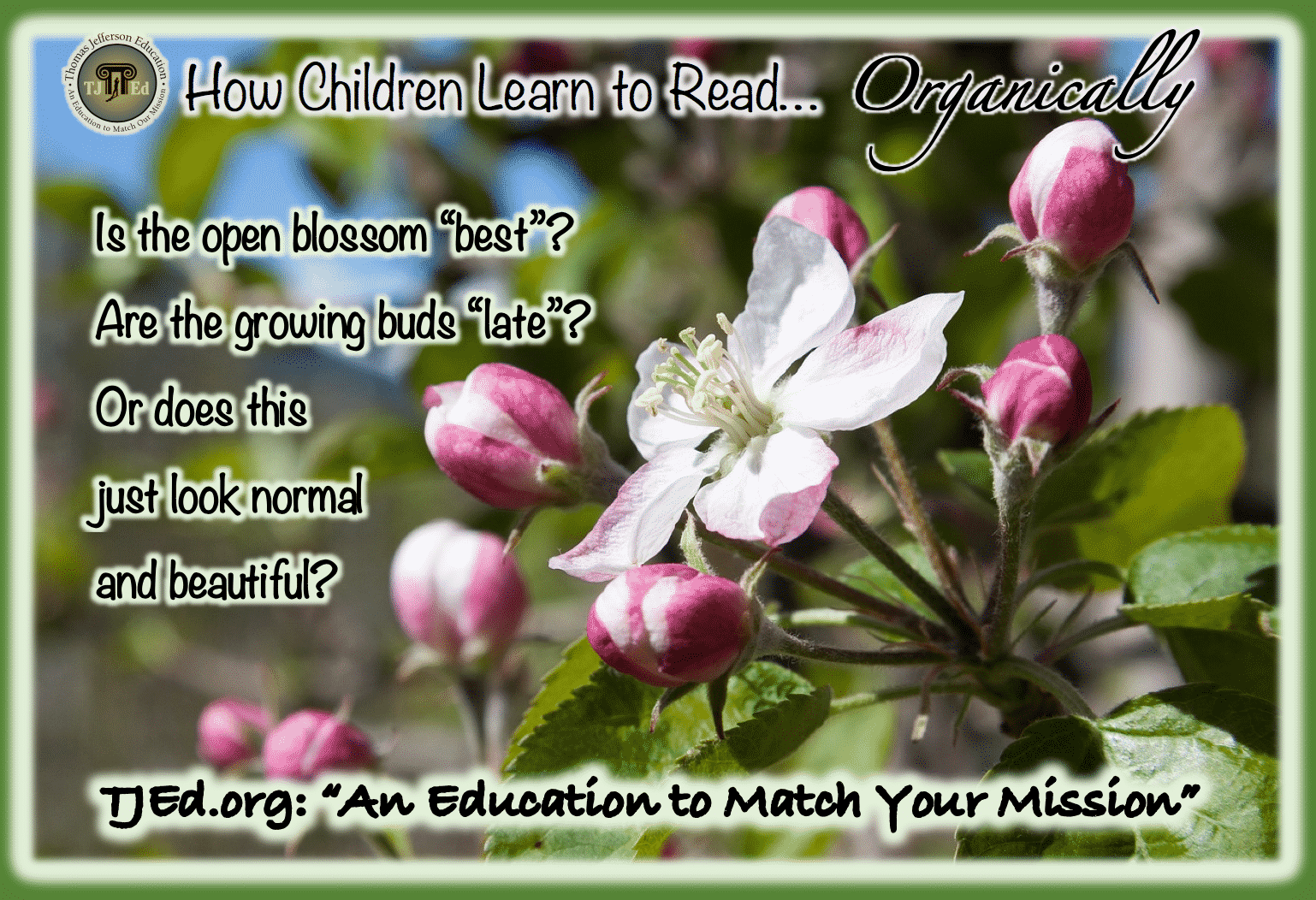 Early start; pause; reading together – led to him reading in his own time.
Early start; pause; reading together – led to him reading in his own time.
JE: My son expressed a desire to learn to read. I had done reading lessons prematurely with him in the past and they did not go over well so we had stopped for a long time. It was at the beginning of summer and I told him I would help him with whatever he needed. Instead of doing reading lessons, we just read A LOT of books together – shorter chapter books and picture books (me reading to him). There was no pressure to read. I did download the hooked on phonics teacher app and let him use it when he wanted. He just wanted to read more than anything. That desire was the most important part. I did get some easier bob books and since he loved the Life of Fred books, I got the LOF readers for him. He really did it on his own. I just tried to help him when he asked for it and continued to model to him what it looks like to love books. He is now a voracious reader.
- DL: How old?
- JE: He was 5 when he told me he was ready. He’s now 8. My now 5 year old is nowhere near ready. Every child is SO different, that is why it’s important to let them swim daily in beautiful words, then let them take the lead. My other daughter struggled until she was 7ish.
“Uninterested” child with autism learned to read by himself….
DT: Hahaha, are you ready for this?
Our oldest has high functioning autism. We didn’t know it until he was 7yo, though. Even as a baby, we always said he was not a performing monkey. He would NEVER do what we asked him to do if he knew it would draw attention to himself. (ie: Smile for Grandma!…nope…)
We did send him to public school for kindergarten, but it was a really bad fit (undiagnosed autism vs old fashioned “you must fit in this box or you’re a bad kid” teacher). Before K, he knew his ABCs, and in K, they did drill him a bit, but he really hated the whole experience. We pulled him at the end of the year and went back to homeschooling (an awesome decision).
The years start to pass and he will not read. My husband started getting really worried, because he had been a tutor in the public school system and was told over and over that kids who can’t read at a certain level by a certain grade will never gain reading competency. Our son was getting close to that age and was not progressing. He would not even try to read in front of me, and would have meltdowns if we did anything that looked like schoolwork (to this day, we call our learning time “Discovery Time” so it doesn’t reference school).
Then, one day, my husband was making dinner (bless him), and our son came in with a Star Wars book. It was a kids’ book, but it was not an easy reader. He simply said, “Dad, I want to read this to you.” He proceeded to read the entire book from beginning to end without a stumble. You see, he is still not a performing monkey, and learning to read in front of someone caused him anxiety, and he didn’t want us to know he was teaching himself in case he failed, so he did it all secretly until he was ready for the big reveal. While he was reading, my husband looked at me with wide eyes and mouthed, “I’m not worried anymore.” He has been a believer in TJEd ever since. 😉
 About six months later, he gave a talk in primary [Sunday School for children] totally unassisted by me. He was poised, confident, and said even the big words without a struggle. He had great vocal tone, and you could he cared about the message, not just the words. The primary secretary leaned over to me and said, “He is such a good reader!” I smiled and told her, “Thanks! Until six months ago, we didn’t even know he could read!”
About six months later, he gave a talk in primary [Sunday School for children] totally unassisted by me. He was poised, confident, and said even the big words without a struggle. He had great vocal tone, and you could he cared about the message, not just the words. The primary secretary leaned over to me and said, “He is such a good reader!” I smiled and told her, “Thanks! Until six months ago, we didn’t even know he could read!”
- CG: Haha, a similar thing happened with our son that has aspergers. The first time I ever heard him read was when he was 11. He had the scripture in primary. I was in the [primary leadership] so I was in the room, but didn’t know he had the scripture that week. He got up there and just started reading a scripture. I was in the back dumbfounded and crying because I had no idea he could do it.
- DT: Yes! My son has Aspergers (they just changed what it’s called, you know…so confusing…). They’re little surprise firecrackers, aren’t they?!
- DR: I have one who is very similar to this. She didn’t want to be taught. We always did read alouds. But when a friend challenged her to finish a particular book before he did, she ran with it. She was 7 at the time. A few months later she started reading in family scripture study and my husband said “when did she learn to read?” My 2 other kids are a completely different story for another day.
- AJ: Such sweet stories! Thanks for sharing! I used to do ABA therapy with kids on the spectrum. I miss those sweet kiddos! All so different, but all so tender hearted and loving!
Two in the same family learned differently, and on their own timeline.
CW: My oldest watched leap frog learning factory twice then knew all his letters and sounds completely on his own with that. I had Bob books and we would sound out the letters and he was reading small words by 3 1/2 years. Then we slowly moved to more Bob books then using the teach your child to read in 100 lessons which he got bored with so we moved to easy books then slowly harder and harder. But it was all him. My second son who is almost 7 is completely different–slowly reading more–but I don’t mind! His brother was just a fast reader.
Read to them daily since birth, learning sight words on lap.
SL: My youngest has been read to daily since birth. Once she got to be about 5, her elder brother was always reading, which made her want to do it. Sometimes, as we read, we would point to each word as we read it. Then she wanted to read the BOB books, so we sat with her as she began sounding them out. Once she made it through some of those, the light went on and it clicked for her. She learned letter sounds through Leap Frog Letter Factory and iPad games.
CG: I have three boys that learned to read this way. The oldest has aspergers, the middle has mild dyslexia, the youngest seems to be “normal”. 🙂 They all learned their letter sounds by watching Leap Frog’s Letter Factory. The only other things we did was read out loud a lot, and I read my own books a lot. We have a very strong family culture of reading. I have a daughter now that is 6 who is interested in learning to read and she likes to do flash cards so we do them, but that isn’t something I did with my boys. When my boys were ready to read, they just did. After that point, there were some words they didn’t know that I would just tell them, but they always picked up on that stuff really quick. We have reading games available, but we never really used them. I know it sounds weird to most that kids can learn to read without any real instruction, but it truly is what happened with my kids.
 Read together; wait for interest; no-stress approach.
Read together; wait for interest; no-stress approach.
EP: We read together (gives context and purpose to reading); I waited for their interest to pique (varied wildly between the ages of 3-8); and approached learning as no stress-no requirement (I don’t mind non-manipulative encouragement to match their desire, however).
I have seven kids, five readers. Several of them seriously taught themselves over a thre-month period when their pique of interest overlapped with a busy family time where I was less available. Honestly, it shocked me the first time it happened, but then I saw it a couple of times afterward and have come to believe it is like learning any other skill. It doesn’t have to be spoon fed, but can be acquired by the seeking mind—especially when the environment fosters it, with lots of other people doing it and shared reading.
My slowest bloomers have read some thick classics and learned impressive vocabulary and English skills.
We were born with a drive to learn!
Oh—and the only one I officially taught to read—like with a program—was the three year old who was my first child. She pushed and pushed me until I convinced her to wait for her fourth birthday for a reading program as a present. She pushed me through the program in three weeks and was done. Done=pick up anything and read. She was the anomaly and super early for me. But all the current readers in my family read extensively and seem to have no qualms regarding book length or difficulty, pending only interest in the material.
- AP: id some with my now 5 year old. But my 3 year old wants to learn and wants something more formal. Her birthday is coming up, so this is a good idea! She might be the right age for the 100 lessons book (it was too easy for my son by the time I tried it) but I’m curious what you used!
- EP: We used the program called happy phonics. We tried the 100 less it’s book and my son hated it! I know a lot of people do like it though. Happy phonics is basically a series of games with very little prep work on my part so it worked really well for ME! She loved it.
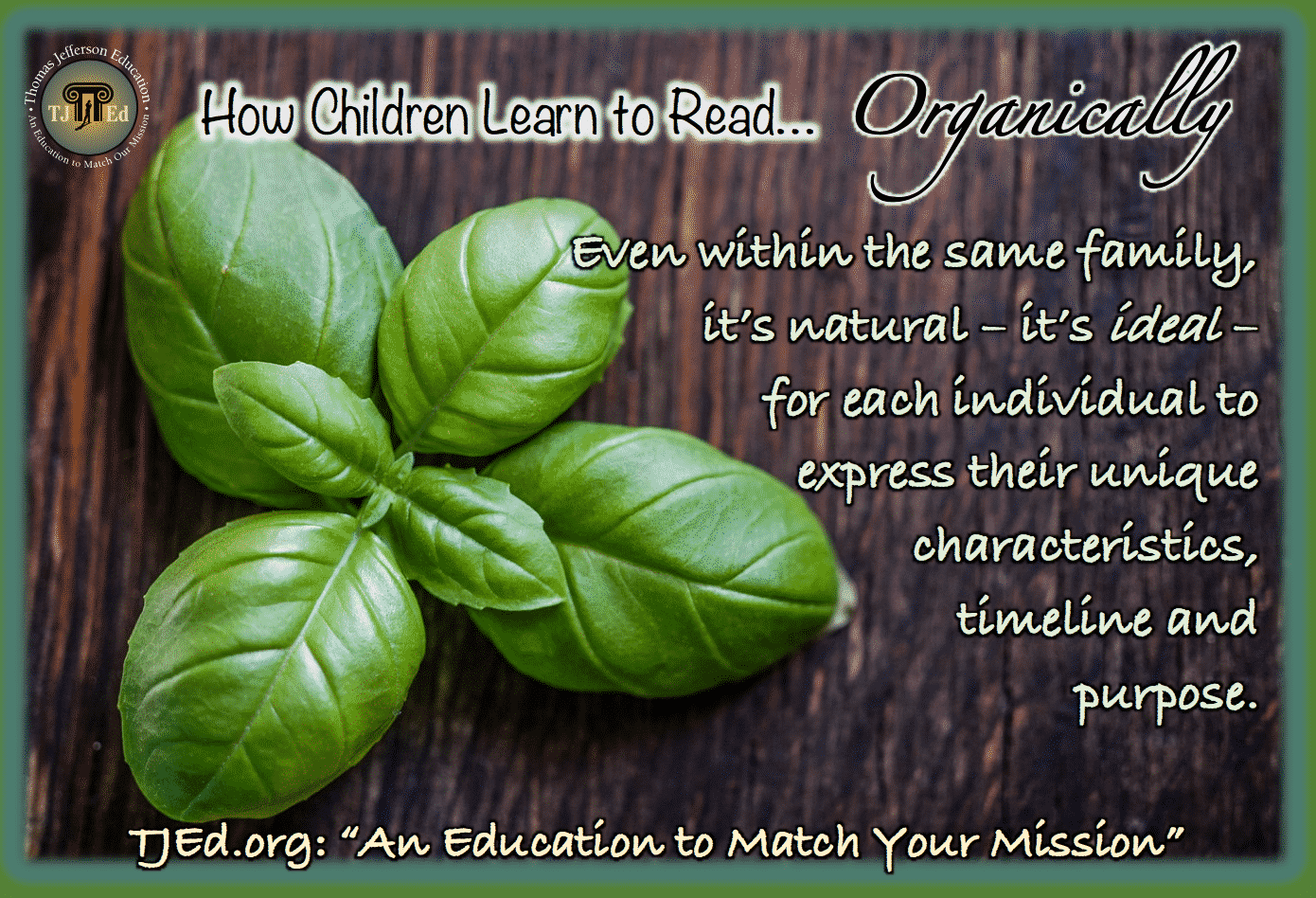 Early reader learns easily without drilling.
Early reader learns easily without drilling.
LR: I learned to read, completely organically, when I was 4. I had this collection of audio books on cassette that came with the physical books to follow along in. My mom noticed how intently I was studying these and also provided music tapes with the lyrics printed out. I also have memories of constantly asking what things said. My son also learned to read organically when he was 4. He was (and still is) read aloud to every day and has access to lots of books of all kinds. Like me, he loved to follow along with me as I read, or with an audio book. And he was constantly asking about what things said. Especially at the grocery store. My nearly 6 year old is just enjoying listening to read alouds and inquiring about letters. She has some sight words, and loves to write.
- DL: Where did you get your audio books that came with the physical book as well? I remember reading those avidly as a kid and loving them.
- LR: I get most of mine at the library. I get the audio book and then just check out the physical book. They also have some that come as a set. I also use the free audio book stuff on Amazon Prime and get the book from the library.
- DL: do you let your kids listen to them alone? I don’t let my kids have iPads so Idk how I would do the audio downloads and the book. Do u just Bluetooth it? Great idea, thanks for the suggestions!
- LR: My kids don’t have tablets, either. I use the computer, mostly. And our radio to play CD/cassette. My partner has a smartphone, so we use that sometimes, too. And, yes. They do listen alone sometimes, especially if it’s a book we’re all familiar with.
Different timelines; different styles. Love of books kept mom from stressing about timing!
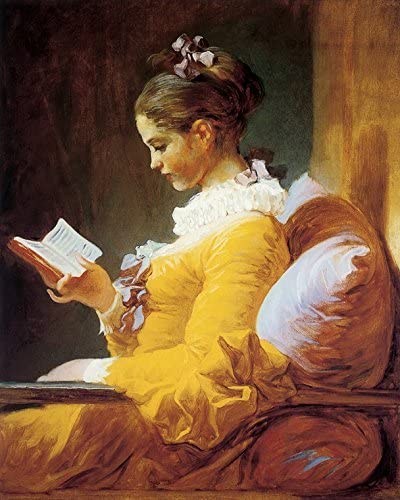 MB: My boys learned organically at ages 4, 4, and 8. The first two picked it up quickly on their own. The oldest asked for books to read by himself at age four so we got him some early phonics readers and he would read those to me. My middle son surprised me by just being able to read, no phonics books or assistance whatsoever. He was four, and I didn’t know he could read.
MB: My boys learned organically at ages 4, 4, and 8. The first two picked it up quickly on their own. The oldest asked for books to read by himself at age four so we got him some early phonics readers and he would read those to me. My middle son surprised me by just being able to read, no phonics books or assistance whatsoever. He was four, and I didn’t know he could read.
The thing that was the same was reading aloud to them, lap reading while following along with my finger and reading scripture at night having them repeat after me as I pointed to words for their one verse. My youngest was slower to pick it up and I was tempted to do ‘lessons’ but I knew that it wasn’t lessons that taught my other boys to read, and I wanted to give him the same opportunity to learn to read in his own time.
I continued reading aloud and reading scripture and I tried to make sure I continued lap reading (which turned into snuggle reading because I can’t see the book over his head if he sits on my lap). He’s also enjoyed audiobooks and had ‘read’ our complete canon of scripture on his own by the time he was eight.
Clearly he loved reading, he just couldn’t read the words on his own.
This helped to ease any worry. I kept introducing more books and usually he would say he just wanted to look at the pictures and didn’t try reading the words. When reading together sometimes we’d alternate pages in easy books and he’d read the words he could recognize or sound out. This summer he read a graphic novel on his own to me and then asked for a series of short chapter books that are adventure books like his brothers read. We looked online and found the Kingdom of Wrenly series. He’s hooked and has read 4 or 5 of them so far. He reads scripture on his own now. He can read nearly anything and reads for information now too. It clicked when he was ready. I’m so glad I waited for him.
- DL: This is awesome. My 4 year old is totally rambunctious. He won’t follow along during scripture. He’ll repeat it from across the room as he throws balls around and plays cars, but he gets mad if I make him sit in my lap and follow the words. He gets bugged if I’m pointing to the words too while we read. I guess I’ll just keep on keeping on until he’s interested again? Haha
- MB: I always back off if they seem uninterested. I’d rather have them love books and read later than be able to read and hate doing it. Sounds like you’re doing the right stuff. Invite and be the example.
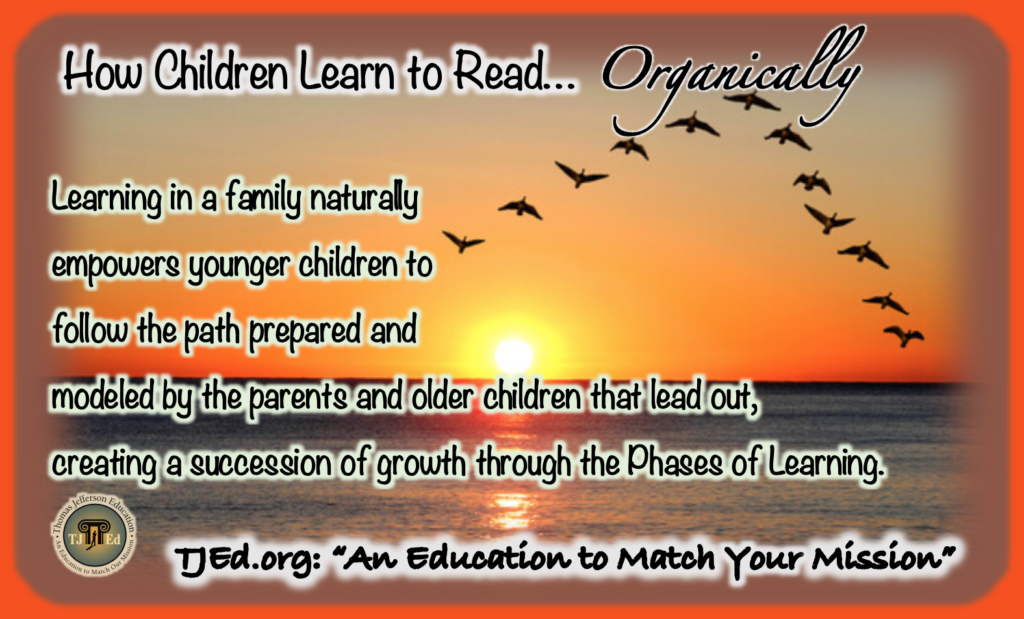 Writing to read
Writing to read
BB: This isn’t entirely organic because she is at public school. I share because it’s a different path to reading. Last year my now 5 year old developed a strong desire to write. They were teaching some letters and sounds at school, but she wanted to write all the words. She spends half of her evenings asking me, “how do you spell…” She rarely asks the same word more than twice. Through the process of writing words down, she has learned what they look like. She now points out words on signs as we drive.
Reading aloud favorites until the child intuits the reading mechanics.
RH: My oldest I explicitly taught to read with a reading program. But my younger daughter would have none of the “tried and true” strategies I used with my oldest. She loved books, though, and I read lots of books aloud to her. Some stories we read so often that she was able to memorize them and soon recognize words from those stories elsewhere.
[RD notes: ^^THIS IS COOL!! I think a lot of people think of this as “cheating” or as an inferior way of teaching reading. That hasn’t been my experience, when a reading-rich environment is reinforced with phase-appropriate exposure to language elements.]
She loved to write and draw–letters and cards for family and friends and short little stories so she was really writing a lot before she could read well. Writing helped her learn high frequency words and practice phonetic spelling. Some people think reading has to come before writing, but in many cases it is the opposite. But the thing that really turned the corner for her was when she was in a musical theater production and she was motivated to learn her lines and read the script. Within a few months of theater she made huge leaps in her reading fluency. Once she knew she could tackle some of the big words in her play’s script, then she wasn’t as intimidated by longer passages in other literature. It’s all about finding whatever their passion is and for her theater was the key.
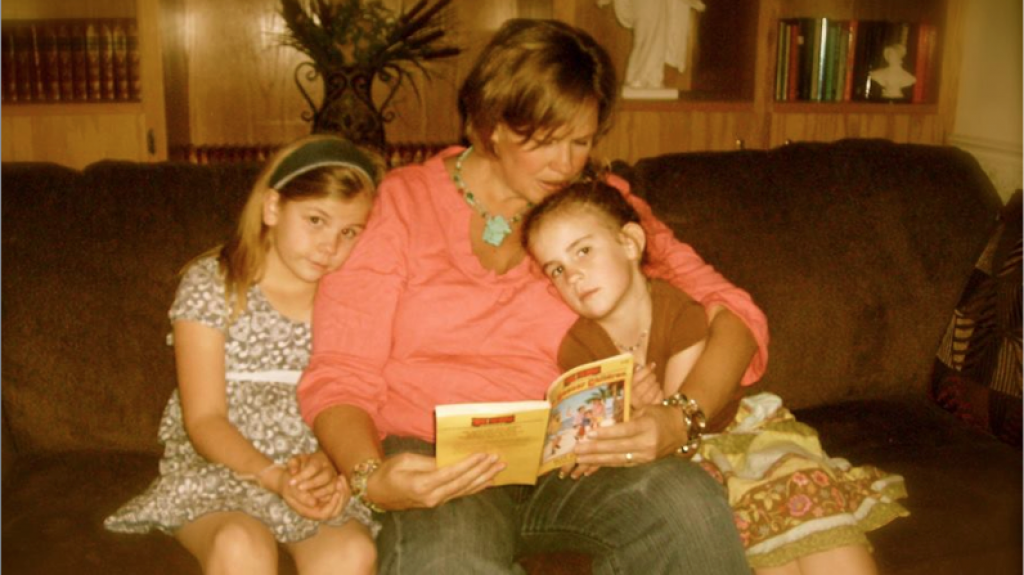 Writing came before reading, and as part of the process of learning to read.
Writing came before reading, and as part of the process of learning to read.
RD: [this one is Rachel DeMille – the author of this post on TJEd.org]: For my kids, writing has come before reading.
- CN: When you say writing came first, do you mean writing tool in hand on paper writing, or writing as to compose something to read? My older kiddos have been “writing stories” for years by dictating to me. They color plenty but my 7 year old is reading far beyond what some might call her expected readong level based on age/grade and she composes fantastic stories, but she still cries about putting pen to paper writing. my 5 year old loves to put pen to paper and write- it’s mostly nonsense, practicing her letters and writing her name, etc – and she *wants so badly* to read but isnt there yet, and can also dictate hilarious stories (often doing this while havimg a random book open in front of her claiming that she is “reading”).
- AD: I am also curious what “writing before reading” looks like exactly!
- DL: Yes, I would love to hear your experience!
- JJ: Oh my goodness us too!!!
- RD: Several asked what I meant by “writing has come before reading.” I’ll explain our organic process:
I’m saying, long before they can read, they start “writing” love notes with letters and, you know, ask me, “What does this say?” Then, somewhere along the way they know the names of most of the letters and will say, “how do you spell sister?” “How do you spell breakfast?” “How do you spell visit?” This helps them learn to read because they are using it and they are decoding as they write things down. Then in scripture study the pre-reader/emerging reader sits by me and if we come to a simple word – it starts with “the,” usually – and every time I come to that word I’ll pause and point, and they say it before I go on. Then we’ll add maybe “and.” Then maybe “so.” And so on. Then there are repetitive phrases that they take charge of when I pause and point, like “and it came to pass”. Before long they can read half the verse with me, and along the way they get to where the familiar names in the story are also in their wheelhouse, and pretty soon, Voila! They can read scriptures with the family. But this is of course chill and cuddly, so it’s no pressure. And meanwhile, the kids play the alphabet game in the car, I’ll ask them to get a can from the pantry and describe the color, the label image, and the first few letters of the word they’re looking for “o. l. i. v. e.”… Then, it’s “Hey – can you take a note down for me (while I’m driving)? There are things I’ll need at the store.” They spell out exactly what you dictate, but at the end of writing it down they can sort of see how those letters and those sounds come together to make that word. Then there’s family reading time where books are our love language. And the little ways in which playing sort of feeds into the reading opportunities – the property cards in Monopoly, a scavenger hunt with really simple clues, a rebus with pictures and sounds that come together to make a word code. You get the picture. This is how my kids learn to read organically.
- RD: we’re 7 for 8, and our disabled son shows signs of being able to read as well. He’s got aphasia so it’s hard to accurately assess, but we’re all pretty sure he’s reading. 🙂
- JJ: ^^ THAT!!! That is exactly how it goes for us too!
- EL: Yes! My 6 year old daughter has been copying books in her own that she is very familiar with. I think she will be my earliest reader and her love of writing notes to everyone is helping her learn to read completely different than her older siblings learned. I love watching it!
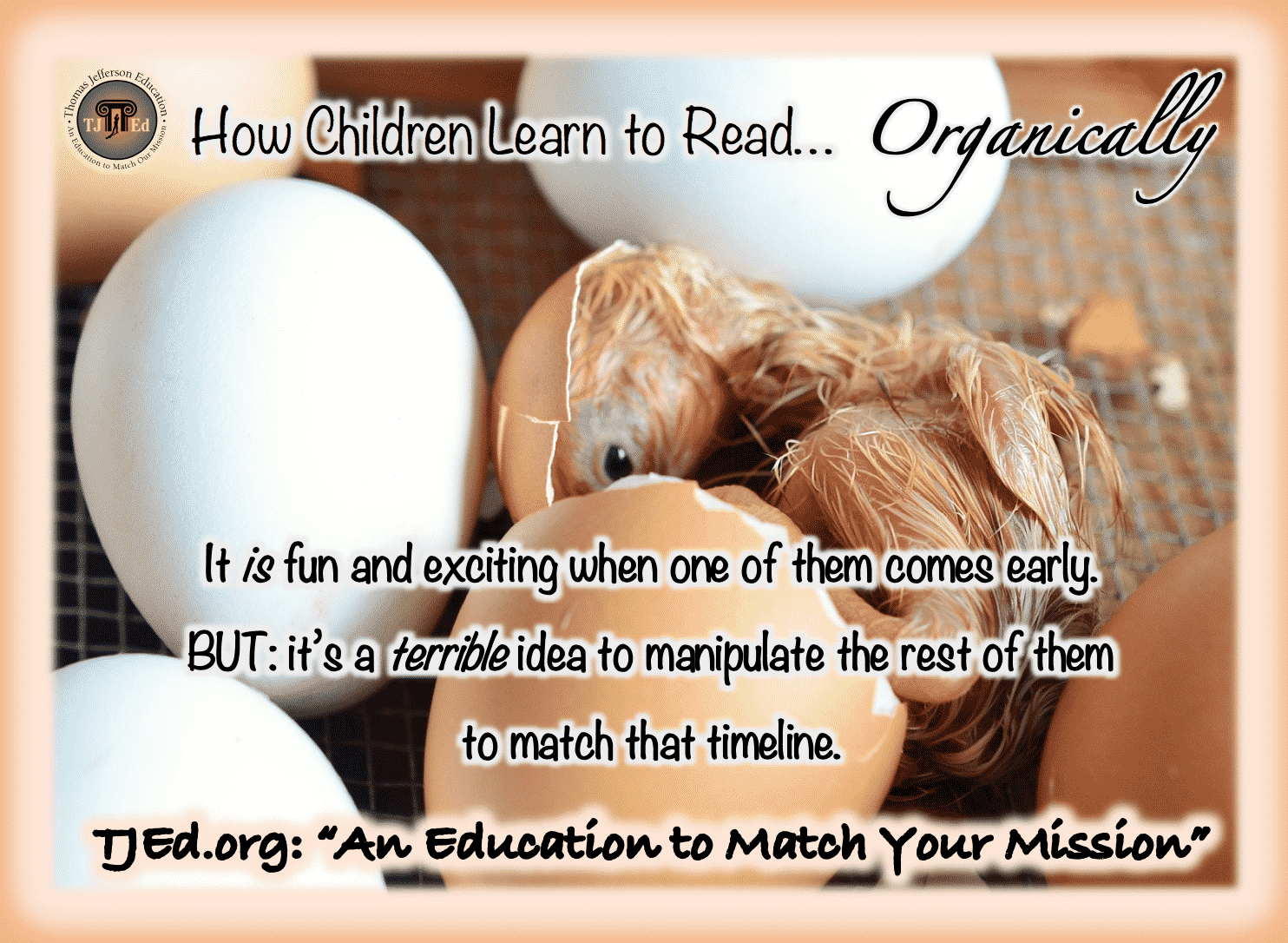 Stop doing the way he hated, and go with the way he loved: actually reading.
Stop doing the way he hated, and go with the way he loved: actually reading.
JJ: I tried 100 Easy Lessons with my son at age 5. He knew the letter sounds and could already read simple short vowel words, like in the Cat in the Hat book, etc.. He hated the lesson book. He started saying he hated school. He didn’t want to learn HOW to read, he wanted TO read. The lessons use nonsense syllables that he couldn’t understand. But that being said, he has special needs and eventually really learned to read by memorizing whole words, and phonics is still kind of hard for him at age 24. But he does LOVE to read and was tested at age 18 and they said his comprehension was at age level. He still substitutes different words that look similar when reading aloud, but it doesn’t seem to affect his understanding (like he might mix up congratulate for congregate) or his immense LOVE of reading!!! In the end I taught him by reading to and with him. At first he wouldn’t even try to read after the experience with the lesson book. Then I would get him to identify letters, their sounds a few words, and eventually we took turns reading a page each. But it wasn’t until I bought the books Frog and Toad are Friends, and Little Bear in two treasuries. He wanted me to read them to him but the day I bought them I was busy sewing a costume for him and couldn’t get to it. So he decided to read them himself, to his little brother, while I sewed. He read what he could and would call out to me and spell the words he didn’t know asking me what it was. He later moved on to shorter chapter books, like The Magic Tree House and then things like The Lion, the Witch and the Wardrobe. He prefers to read along with audio books but can read on his own quite well most of the time. He LOVES to read and is ALWAYS reading, despite having some slight challenges. I am glad we stopped doing it the way he hated and did it the way he loved…by actually reading.
- CG: I would only use this book for children who struggle to figure out how to turn those letters into sounds.
- JJ: My son did struggle (and still does at times) with sound blends, but for him it was silly to say nonsense words. It frustrated him. He wanted real words, and real reading. Bottom line for me though was how he was saying he hated school (we did maybe 15-20 minute lessons with the book each day for maybe 2 weeks). Definitely NOT what I wanted him to feel about learning.
- CG: No, definitely not. I used it a lot more sparingly. Like 5 minutes a day, whenever he was willing. It took us probably 18 months to get through 55 lessons and then he was bored with it and took off reading. Of course, every child is different. I hated the book the first time I looked into it as well. This time around I paid less attention to their way. It’s very “Say this”.
Repetition; daily scripture study.
DD: I used the old Dick & Jane books with my kids. Repetition plays a huge part. We also read scriptures EVERY day from the time my kids were about 18 months old…they learned organically by sitting on my lap or next to me and I would point at the words as I said it…then they would say the words as I pointed at them…and their desire to read more and more words grew…
- [RD: This is how it works in our house, too….]
Sight reading select words on parent’s lap
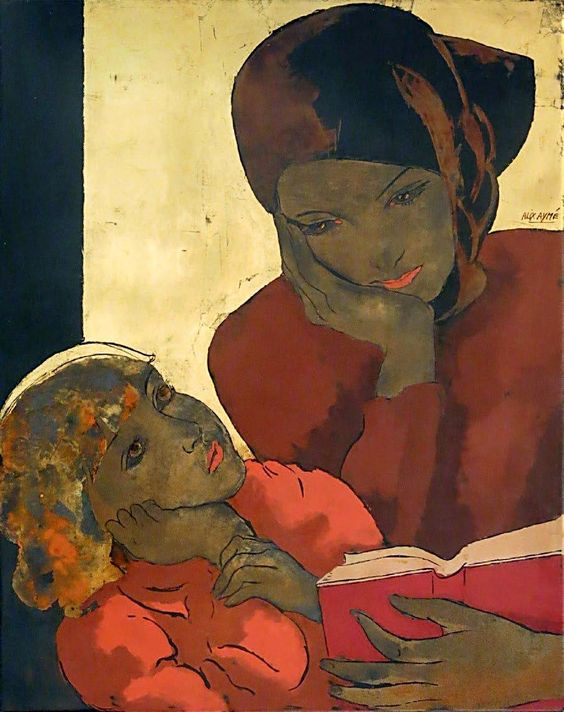 TM: My oldest is only 6, but she’s doing great with reading. I read a lot for myself, as well as out loud with my kids. They tend to pick up books and”read” (make up stories, tell the story from picture, pretend they are reading) from when they are very young.
TM: My oldest is only 6, but she’s doing great with reading. I read a lot for myself, as well as out loud with my kids. They tend to pick up books and”read” (make up stories, tell the story from picture, pretend they are reading) from when they are very young.
We played games with letters, one of her favorites when she was learning letters, sounds, and sight words was to hang them on a wall and she’d hit them with a clean fly swatter. Another is sidewalk chalk-wiring letters, she’d stomp or jump on them, say their sound or name.
When she was first learning and we’d read together, I would give her one or two words and use my finger as I read, she would read her words when they came up.
Now when we read, if there is a word she doesn’t know after trying to sound it out or say it, then I’ll give her the first sound or syllable and she can usually figure it out from there.
Ever since she started to learn words, when she “reads” her scriptures, she looks for words she knows and highlight them. Now that she can read while verses, she reads more and doesn’t do as much highlighting.
I found if I ever tried to force it, she just pushed back and wouldn’t want to do any reading for a couple of days. If I just offer it, and let her come to me when she is ready or wanting to do more, then it is smooth and she picks up on it quickly.
- DL: Awesome! How old was your daughter when you played these games? So at some point you did try and teach her how to sound words out?
- TM: She was young. She knew the alphabet in Spanish before she was two… I just provided the stuff and invited her to join in.I didn’t do anything formal. With sounding out words I think it came from reading together. I would give her a few words for her to read and try to have them with the same ending sound, so she kind of picked up on it that way. And then when she knew basic words and she would ask about a new word, if it was phonetic, then I’d say each sound individually slowly, then faster.My 4 year old is a different story. She has just recently started showing interest in learning letter sounds. She can identify most letters by name, but not all. She really likes writing the letters though. I have gone through the activities with her and my 6 year old at the same time, but she just hasn’t been interested. She’ll join in for a bit but ends up doing her own thing.And then I have a 2 year old who knows some of the letters already not all by name, but by who has that letter in their name. If she sees a D she’ll say “daddy” if she sees an M O or W she’ll say, “mommy” if she sees the letters that start with her sisters names she’ll say their names. It’s been interesting to see how each one has grasped the them, and what had caught their attention.
Eclectic resources for fun; kids pick it up organically.
JR: We start with Zoo Phonics just for fun. ❤️❤️ Since my kids have all asked me to teach them to read, we then begin Phonics Pathways with a few Happy Phonics games thrown in. Secret Stories is also a fun addition.
To be honest, we have never finished the Phonics Pathways book because my kids have sort of organically and instinctively started reading on their own after the first several lessons and the book then became something like busywork. Pathway readers have been an excellent introduction to independent reading.
Letters and sounds part of everyday; keeping it fun and pressure-free.
SB: My son when he was 4 or 5, he liked workbooks and started getting interested in the letters and phonics. When he was looking at the workbooks, I would help him with the sounds. We would play little games with letters and sounds. Then when we would read I would ask him if he could sound out some words. It was always just in a fun way, never would I make him do it, or say “now we are going to learn to read”. We read a lot together, he always loved books.
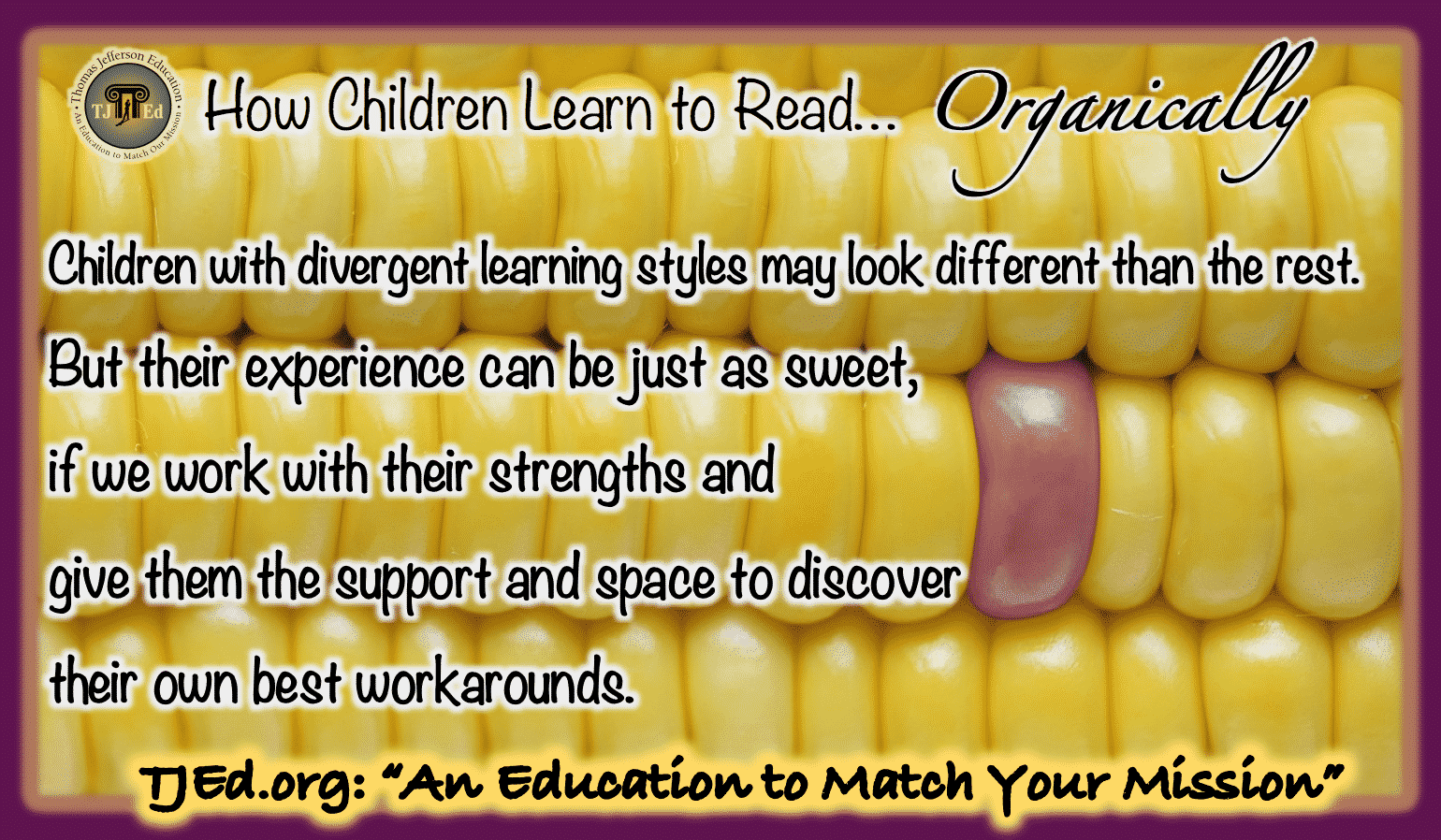 Lap reading sight words, following along with parent; chants for phonic awareness
Lap reading sight words, following along with parent; chants for phonic awareness
LD: For me, it started with memorization. A great book for that is Brown Bear, Brown Bear by Bill Martin Jr.
For my daughter it also started with “how do you spell…?”
Also, as you read aloud the easier books, delay the word and see if they will say it for you (and follow along with your finger so they see the word as they say it) For example: Read: Jack and Jill went up the… Then pause and see if they will say hill.
Also help them start to recognize sounds of words. When a child starts to develop reading readiness, we begin a family stutter of sorts. B-B-Bear, SSSSSsnake, D-D-Dog. Or even at the end of words nooooo, dolllllll.
Oh, but my son is definitely a whole-to-part learner. So he does better reading labels. So we label all the things in the house that can be labeled without causing issues.
Articles on Reading Readiness and Acquisition
KR: My favorite articles about learning to read:
- Reading Readiness Has To Do With The Body
- Reading Has To Do With Play
- 11 Reasons Sing-Songy Names and Rhymes Are Important
Readaloud and audiobooks
CH: We read aloud whenever we had the time. Listen to audiobooks instead of the radio whenever we are in the vehicle. Go to the library weekly for new books, and spend a lot of time just looking at them. When the kids got older and asked more questions, I would help and encourage them. We did a little bit of “teach your child to read in 100 easy lessons”… until that got fed up/annoyed with it, and then kept encouraging them.
 Readlouds; rich vocabulary from classics and scriptures. Some started earlier, some later. All are excellent readers.
Readlouds; rich vocabulary from classics and scriptures. Some started earlier, some later. All are excellent readers.
DG: I read aloud to my children from the time they were young. I snag to them folk songs and hymns as lullabys. They had a vocabulary rich environment.
My first two discovered that signs had words and would ask, “what does that sign say?”. They began reading and 2 and 4.
Then we were doing daily scripture reading. Each taking turns, the nonreaders got one verse to lap read with me aloud. When they got to the point they could read on their own, they got 5 verses instead of one.
We went to the library and they selected books to look at and for me to read to them, until they could read on their own. Neither had phonics. One was an excellent speller, the other not. So I bought Hooked on Phonics for them to learn phonics for spelling when they were school age. They did not use it at all; not once.
Their sister went to half of kinder, homeschooled then went to school 1-3 grades. They tried teaching her to read. She was not ready. She is a November birthday, so she did not start school until almost six. They even put her with the principal (the reading specialist). At the end of third grade she was reading at two years below grade level. That summer she decided she wanted to read. So she found the head phones, a tape recorder, and the Hooked on Phonics and taught herself without anyone knowing. Two months later when she went back to school they tested her two years above grade level. Yes, a four year jump in two months. All her own doing! They thought she cheated, so retested her a month later, in September. She was then functioning more than three years above grade level in reading and math and so they grade-skipped her. She was just a month shy of her 10th birthday. She came home to homeschool permenantly a year later.
She is six years older than the oldest of the next four children. I used the same methods of reading aloud to them and studying scripture with them. However, I direct taught them reading lessons. By twelve, all were reading on the high school level. Some started early, others started late. All are remarkable readers.
LL: My son was very motivated to read and he started with the BOB books at around 5 yrs old. But the books were not engaging or motivating. At 5 he could see they were silly and not helpful. I got rid of them and then I kept reading out loud w him and his siblings. During copywork twice a week I would spend 1-2 minutes pointing out phonics rule in the copy work he did. Just one rule each lesson. So one day it was capitalization, another day discussing when two vowels go walking the first does the talking, etc etc. I didn’t require him to read to me just to listen. When someone else would ask him to try to read I told them not to do that bc it makes it stressful. A couple months ago he asked me to read a book we had already read (chapter book over 200 pages). I said if you would like to read it you can but I’m in the middle of reading other books to you and your brother.
Now he reads that book, El Deafo by Cece Bell, so easily and enjoyably. It’s not an easy reader. That’s our story. Now he tries to read everything.
Keep it enjoyable and something to strive for in their own time and find an opportunity for them to push themselves rather than you pushing them. He’s 7 now.
He loves writing. Wrote well before reading with ease.
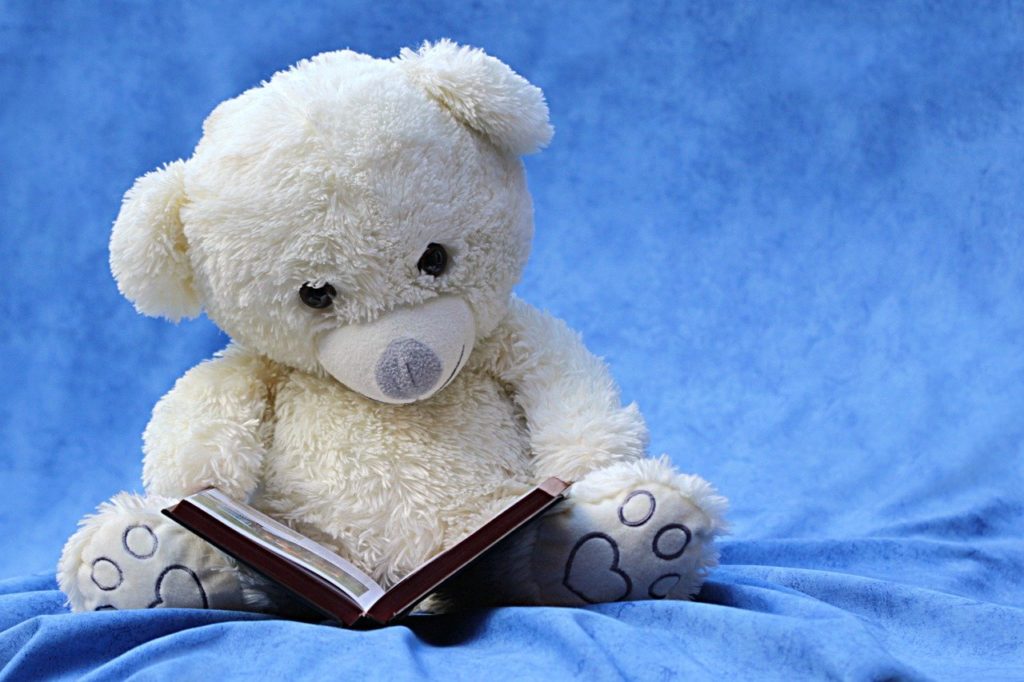 CG: I only half get to answer this. We weren’t exactly organic with my 7 yr old but it wasn’t “lots” of lessons either. He didn’t have much interest in learning to read and was the latest of my children so far.
CG: I only half get to answer this. We weren’t exactly organic with my 7 yr old but it wasn’t “lots” of lessons either. He didn’t have much interest in learning to read and was the latest of my children so far.
We got the book “Teach your Child to Read in 100 Easy Lessons”. We took close to two years to cover the first 55 lessons. So that’s why I say not “lots”. We only did them when he wanted, though I suggested it a lot or made deals “How about you do one reading lesson and then I will…..” But I never forced him.
About lesson 55 he got bored with the book but had the concept down so he moved onto early readers from the library. I encourage him to read a book a day. He’s now onto easy picture books. The other night he read 5 verses of scripture. It was actually easier for him than some picture books because the words and phrases are so familiar to him.
With my older sons, I made a bingo type game so they could recognize that words matched. I took the 100 top words to learn to read (something like that in a google search) and used those words for our game boards.
AH: More of a list but my belief in this process was so strengthened when 2 of my kids learned to read this way at 7 and 6. We have a reading rich environment, ie lots of good books around, regular library trips, lots of reading exampled by other family members, read aloud books (from picture books to classic novels), reading them words we see on signs, storefronts, buildings, etc. Pointing out letters, rhyming for fun, emphasizing letter sounds, talking about weird sound rules when we encounter them (like ph = f sound or silent letters and letter blends). Like anything else, kids are a sponge, they’ll soak up what they’re in. Surrounded by a literary-rich environment, it gets in them 🙂 also worth noting that we don’t have a TV and limit occasional shows via computer but no other screens or devices for them. They LOVE audiobooks as well.
When they are really beginning to want to read they asked for 1:1 time reading with me and I took extra time, letting them read to me, giving very little correction and always willing to step in and read if they grew tired of it or were stuck on a word. Always encouraging of any skill level, and “teaching” was subtle with a nonchalant comment about a specific word or letter blend rule. Usually sounds something like, “isn’t that silly that when ph are together it makes a “f” sound?!”
- MB: Yes! To all of this. Talking about letters, sounds, and funny rules in English happens daily. Sounds like us (but we do have tv, just limited to family movie time or documentaries mostly, and sports-my husband loves sports?).
- AH: And my now 8nyr old is a social, easily distracted sanguine child that had no interest in mastering it right away. I could tell he had the necessary abilities and just not the interest yet so I didn’t push it and sure enough when he wanted to, he just did it 🙂 he was about 7. My very task oriented and competitive son kust younger than him basically completely taught himself shortly thereafter at 6yrs old. A year later my 8yr old is proficient and my 6.5 yr old is reading most everything he grabs with little exception. It works 10x better than my oldest boy that had to have reading help in public school in 1st grade because he was “behind “. We homeschooled after that year and his 5th grade level testing (required in MN) showed him at 11gr reading level.
JS: I used the “method ” Ruth Beechick recommended in her book the 3 Rs – we used real books- Dr Seuss, Little Bear, and we played games with Bananagram tiles- putting them together to see what sounds the letters made and whether or not they were real words. Also reading A LOT to them aloud from all sources.
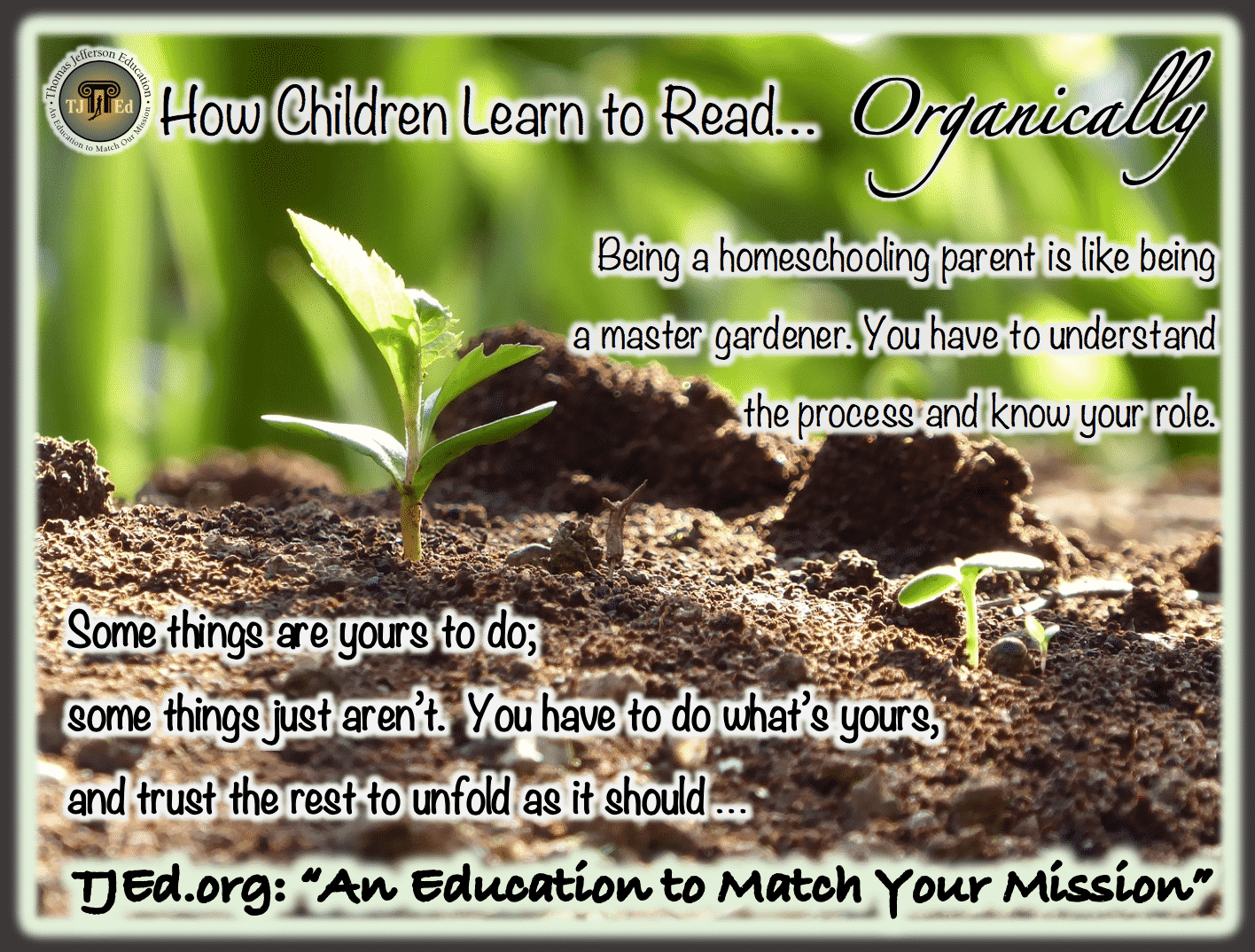 SH: So far of mine have learned organically all around the age of 7. We absolutely waited to to talk about any kind of mechanics until they asked for it. My latest asked for a while and then backed off and so did we, and then asked again later. It always came to a sort of pain where they realized they were missing out. From early on, we would take turns reading scripture as a family and we would tell them what to say so they could read their verse. As they matured they would read the small words they knew and we would help them with the rest. The words they could read would gradually increase and then they would start figuring out words by themselves. Each child had a little variation and small exposures from others about mechanics in different ways. They all saw mom or their siblings reading and talking about what we read and enjoying it. We would also sing out of the hymnbook with them and point to words as we sang.
SH: So far of mine have learned organically all around the age of 7. We absolutely waited to to talk about any kind of mechanics until they asked for it. My latest asked for a while and then backed off and so did we, and then asked again later. It always came to a sort of pain where they realized they were missing out. From early on, we would take turns reading scripture as a family and we would tell them what to say so they could read their verse. As they matured they would read the small words they knew and we would help them with the rest. The words they could read would gradually increase and then they would start figuring out words by themselves. Each child had a little variation and small exposures from others about mechanics in different ways. They all saw mom or their siblings reading and talking about what we read and enjoying it. We would also sing out of the hymnbook with them and point to words as we sang.
JH: Read read read to them, then they ‘read’ the books to us (they memorized the stories), then they wanted to have turns reading family scripture time and they picked up words as we read together….then we would read the words they couldn’t read in the verse but let them read the ones they could. They both learned to read at age 4 without any kill and drill or even pressure to read.
LP: My younger son learned to read on his own with starfall online when he was 4. There was no promoting by adults, his 5 1/2 year old brother had a subscription and the 4 year old just loved playing the games and then sometime during that year we realized he was reading on his own.
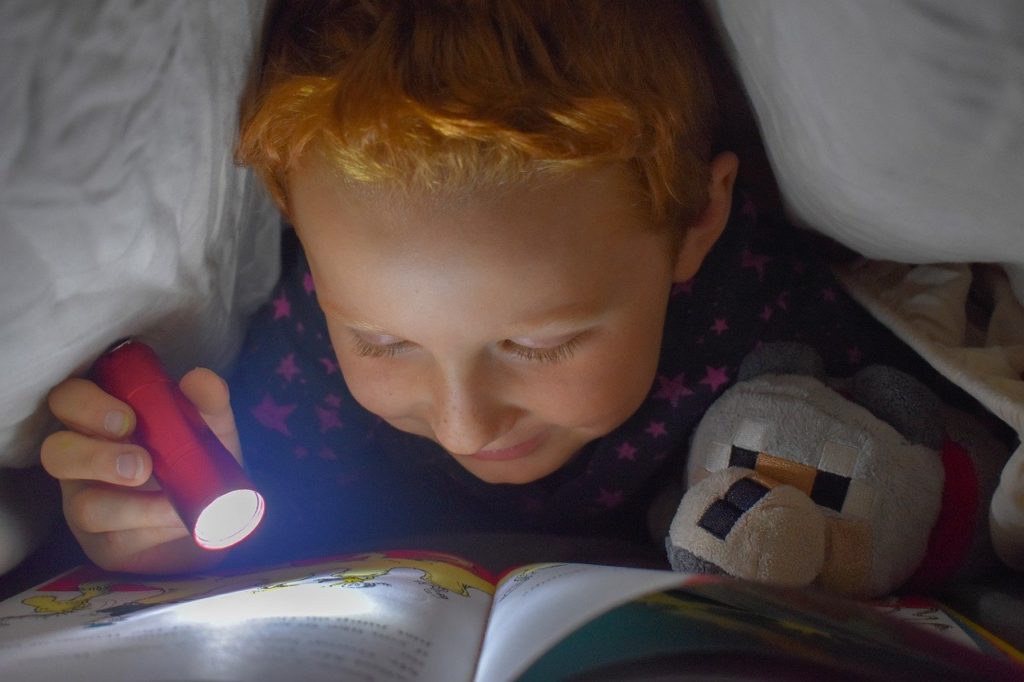 DM: It was especially difficult when my oldest was kindergarten age and was “falling behind” in reading. I knew she was so smart and I felt a lot of pressure. But it was an amazing learning experience for me. At the time she was noticing that her friends at church could read better than she could and she was frustrated and I was wishing she would choose to put some effort into it because it was stressing me out. My husband and I discussed it and we looked at our options, go conveyer belt and make her practice reading every day until she caught up OR trust the process that had made so much sense to us. So, he and I made a two part plan 1) Get off her back about reading, basically never suggest that she read anything at all, 2) Triple the amount of read aloud we did with the family (we had two other kids at the time). We followed that plan for about a month and then one day I was walking by and saw her reading aloud to her little sister! Now she is an avid reader and can tackle anything on the shelf.
DM: It was especially difficult when my oldest was kindergarten age and was “falling behind” in reading. I knew she was so smart and I felt a lot of pressure. But it was an amazing learning experience for me. At the time she was noticing that her friends at church could read better than she could and she was frustrated and I was wishing she would choose to put some effort into it because it was stressing me out. My husband and I discussed it and we looked at our options, go conveyer belt and make her practice reading every day until she caught up OR trust the process that had made so much sense to us. So, he and I made a two part plan 1) Get off her back about reading, basically never suggest that she read anything at all, 2) Triple the amount of read aloud we did with the family (we had two other kids at the time). We followed that plan for about a month and then one day I was walking by and saw her reading aloud to her little sister! Now she is an avid reader and can tackle anything on the shelf.
So, now I would say read to them all the time, both from picture books and novels. Talk about the books you are reading. We’ve also have a quiet time in our house, when our little ones are napping, everyone else goes to his or her own room and does something quiet, which usually ends up being reading. I think this is the time that my kids get a lot of their reading in!
- RD: Way to double down!! <3
NC: I literally just read to them… a lot… it started with just bedtime stories every night when they were wee-littles, and we spend 30 min a day on our read alouds now (they are 11 & 8)… my daughter just picked it up and started reading at 5, and my son did the same at 7. Now they’re reading on their own right now!
No phonics or workbooks or curriculum. Just read to them.
RH: Mine learned letter sounds from leap frog letter factory at age 2ish. Then around 3 or 4 i start helping them to see letters in the world and the sounds – sounding out 2 letters together. And asking them just out and about questions about sounds in things they point out. They like the meet the sightwords movies and they did play starfall but didn’t understand the rules and things on it until after I taught them. So it was more for reinforcement learning. They then advanced to teachyourmonstertoread.com and then they just read around 7ish. They have been slowly learning to read and one is just getting proficient at 11yrs while the other got it at 4 yrs old. both boys the same age, taught together. I did use 100 lessons but only taught them to lesson 20 and it was just the visuals I used not the entire lesson. it taught them that m e makes me. Then I got them the BOB books. starting at level 1 not kindergarten level. I used Halloween candy to give 1 piece for every book they read and they taught themselves. They then started getting library books after the BOB books. The only thing I actually taught them was a lesson on silent e using clothes pin of e on the end of an index card with a word to make it a new word. And explaining silent vowels to them by describing them as secret agent letters that were so sneaky that they didn’t talk but snuck up on the first letter scaring it into saying it’s name while the secret agent stayed quiet. I also told them that ph makes an f sound like in phone. but the rest they learned from the movies and computer games and reading. oh, i also taught them the vowels using the story i learned as a kid. that a neighbor borrowed a cup of sugar and the next time they saw them, they said… A E, I O U a cup of sugar.
KG: It began with just reading something aloud every day. I have a few reading games on my phone and phonics dvd’s that I let her play/watch as a reward for chores done. We listen to audio books in the car. She started by pretending to write and mimicking writing/reading. I gave her a set of Dick and Jane readers, but I only sat down to read them with her when she asked and was actively seeking to read. She taught herself to read by age 5 and is fluently reading now at 7.
 JJ: We read and discuss. We read a lot. We read everything. We read aloud. Laura Ingles Wilder is where we started. We use the TJEd website classics reading lists. We start from the top and go down part way, start over, skip around…The family reading reading list IS our reading list. Our National book (Read A Thomas Jefferson Education to know what that means), we read the most. It’s read every day at least once a day. We read Bob books! Bob books are short, sweet, and simple, so when they can read one from start to finish, they feel accomplished. We use the math classics list on TJEd too! The math classics are all fun to read! Greg Tang is a funny author! Life of Fred is SO fun.
JJ: We read and discuss. We read a lot. We read everything. We read aloud. Laura Ingles Wilder is where we started. We use the TJEd website classics reading lists. We start from the top and go down part way, start over, skip around…The family reading reading list IS our reading list. Our National book (Read A Thomas Jefferson Education to know what that means), we read the most. It’s read every day at least once a day. We read Bob books! Bob books are short, sweet, and simple, so when they can read one from start to finish, they feel accomplished. We use the math classics list on TJEd too! The math classics are all fun to read! Greg Tang is a funny author! Life of Fred is SO fun.
As we read, though, we stop, we discuss, we take a tangent and run with it. We learned about whip making and watched trick whipping on youtube one time during Farmer Boy.
Something I have felt is very important is I don’t tell them that they can’t read! If they “can’t” read something, and they say, “I can’t read that.” I say, “Yes you can to read that. We just haven’t gone over it yet. But you can read, and you can definitely read that.” I never ever say, “You Can’t Read.”
My littles are 3, 6, 7 all girls.
So, the day can start before or after breakfast. They are normally playing and reading together or by themselves starting around 6am. We eat breakfast around 8-9. When I’m ready, I’ll say, “grab a book.” and we just start. And we go from book to book (picture books) until lunch. We discuss each book. We talk about the morals. We talk about the feelings of the characters. We talk about the art work. After lunch, I try to read aloud a chapter book. If they’re not into reading after lunch, then they can run off and play. They’ll ask to do computer/tablet learning, which is more individual and self driven, but I’m picky, and that’s more of a couple times a week activity. Dinner cooking starts around 2-3, and they just fool around until after dinner, when we start reading aloud with dad now home. We read for 1/2 an hour in the evening.
My oldest daughter, now 7 almost 8, can read. I did not teach her to read. She taught herself/learned entirely organically from listening, watching and following my finger. My second oldest, she is going this way. we read a lot, and she’s catching on. She knows small words, “the, and, in, of, for” type of words. I don’t push. I let her read the words she knows, and we just go along with the rest. There is NO pressure to read. There is only “You can already read, you just don’t recognize that one yet, and you’ll catch on as you go.” I’m not into the tablet/computer games because I thing electronics are addictive, but she LOVES doing like Teach your monster to read type learning games, so I let her do that once or twice a week.
- LM: So..for school it sounds like u read books. Do u plan anything or just grab books?
Do u teach them handwriting at all or let them figure it out?
Do u do math games or books too? - JJ: I’m sorry it’s taken me so long to respond! I wanted to give you a good answer, so I waited until I had my computer out again. I will often both plan subjects to read and just grab. Like during the solar eclipse here in KY, I made sure we had a lot of solar system books available, and our focus through much of August and September was about the solar system. So I have books with a subject I am interested in them learning about and they will also get to pick their own random books from the library as well. I do look at the public school standards for the grades of my girls. I have found that we keep a more diverse book stock when I am reminded of things that I wouldn’t have thought of on my own.I DO teach them handwriting so that they can write their letters efficiently. I think that when letters are written properly, it’s easier for them to read. BUT I don’t push this either. My oldest prefers to write in all capital letters, and I let her. My husband writes that way, and she might understand letters better that way, so I let it be. As long as she knows the difference, and as long as I have in her portfolio (just in case we get a visit from the state) that she can do both.We do ALL KINDS of games! Especially math games. We play games that are above their age level since I’m not expecting them to figure things out on their own. For math, I try to incorporate several ideas at once so real life use is clearly understood. Like when we read about the solar system, we also read about seasons, calendars, time, space, distance. I keep the details light at first, then we get more in depth gradually.We are very much still in core phase, but my oldest two are clearly developing a love of learning, my oldest starting to transition into that phase of learning, so I try to keep enough books from the library lying around so we can go as in depth as they are ready to go.
JJ: I completely forgot about my oldest writing before reading!! I think this was one of the most important parts! She wanted to write letters to her grandmother, but she didn’t want to learn to read! So I would write out what she would want to say, then she would copy all of my words, learning to read entirely because she wanted to write! LETTER WRITING IS SO IMPORTANT TO THE READING PROCESS!
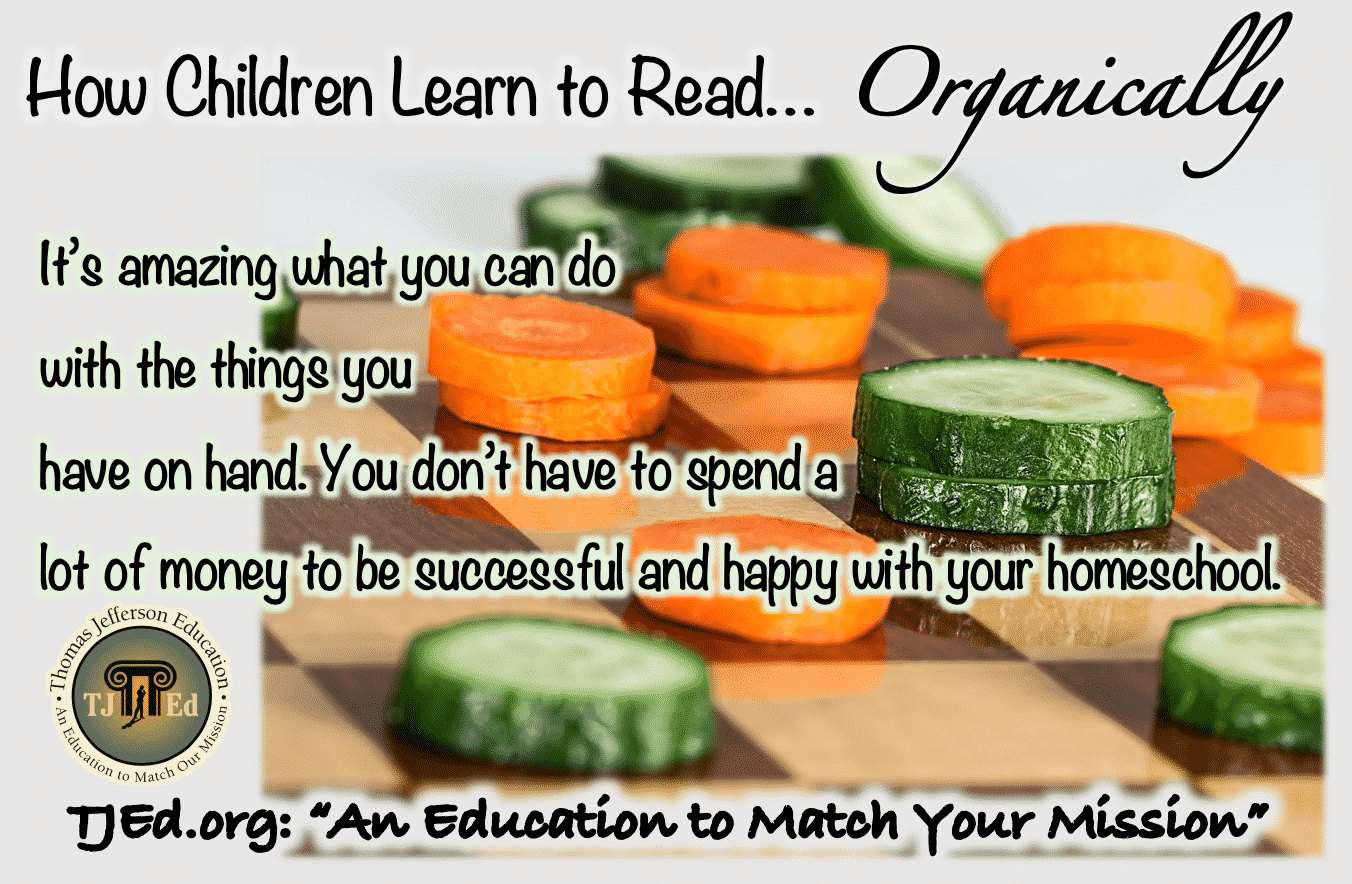 KPB:
KPB:
- read aloud since before birth, for the love of books
- puzzles, foam letters and other manipulative with the alphabet. We would go over letter sounds as we put together or played
- painting or drawing letters and saying letter sounds
- I would write easy 2 or 3 letter words to start teaching how the letter sounds put together would make a word
- starfall.com and hooked on phonics (used loosely) for practice
- purchased used readers (Abeka & Sing, Spell, Read & Write)
- they would naturally want to read their own chapter books once they had confidence. (All 3 were different ages at this point. And all love to read and learn because of TJEd!)
RW: I pulled wwwaaayyy back on phonics and sounding words out. Instead, I let my son pick his own library books, and read aloud from those and a chapter book, faithfully. On the laps of monthers. I was so scared to trust the process. Sure it sounds good. But what if he falls behind? What if I ruin him? What if he never reads without formal lessons? So many worries. Then one day, ds was 7, he was sitting on his bed ‘reading’. He chuckled…he snickered, he laughed out loud. I asked him what was so funny. His reply was that he just loved Calvin (calvin and hobbes). I asked what calvin did that was so funny. He read aloud the part that made him laugh. I knew in that moment that at least for that son, I had made the right choice, by backing off.
KC: The Usborne first reading library. (yes I’m a consultant. We bought the library long before i joined) The format of the books make it so you are learning to read through storytime. They have a “read with me” style that progresses through the books, so like the first book in the set has 90% parent reading, 10% child reading and as the books progress to level 15 that parent percentage drops to 0%. It’s almost like the kids don’t realize they’re reading more and more until they’re completely independent. I can’t say enough good things about that set. It had both of my boys reading chapter books before Kindergarten and loving it.
 CO: Wow, this is a big question. I am actually currently documenting my experience with my sons learning to read. If anyone is interested in following along you can check it out at https://www.facebook.com/littlerabbittrails/ I am using #piercereads to find the posts. I seriously just started and he does not know how to read at all. So this is what I do in a nutshell. First off I read lots of books. Both children’s picture books and Chapter books. It is important to read their favorite picture books over and over. This way when they look at it on their own they will be able to start figuring it out on their own. Chapter books help develop their vocabulary and learning sentence structure (also good for writing MUCH later.)
CO: Wow, this is a big question. I am actually currently documenting my experience with my sons learning to read. If anyone is interested in following along you can check it out at https://www.facebook.com/littlerabbittrails/ I am using #piercereads to find the posts. I seriously just started and he does not know how to read at all. So this is what I do in a nutshell. First off I read lots of books. Both children’s picture books and Chapter books. It is important to read their favorite picture books over and over. This way when they look at it on their own they will be able to start figuring it out on their own. Chapter books help develop their vocabulary and learning sentence structure (also good for writing MUCH later.)
PAY ATTENTION! If my son asks what something says, I tell him. It I see a big sign I may way out loud “Wow, look at how big that ‘T’ is on that Target sign.” If the child asks “Mom, why did you stop?’ I answer with, “Because, that sign says STOP.” When one of my children says they want to read a book before they know how, I point out a single word for them to read like ‘I’, ‘a’, or ‘the’. When I get to that word I pause for them to say it. He may remember or I may have to tell them. If my child says “MOM! Don’t tell me.” then I don’t help any more unless they ask. Eventually I add new words, they may ask about words, they may ask how to spell words. All of this helps with reading.
Books I use: first picture books for little ones.
Then I use Bob books because they are super easy and the child can feel success often. It also helps with sounding out if a child is into that. Some are better at just memorizing words.
Then we move to Dr. Seuss like, Go, Dog, Go, Hop on Pop, Apples Up On Top, and so on.
Then simple chapter books like Spiderwick, Magic Tree House, Beatrix Potter (the fierce bad rabbit and other simple ones), Of course, we also have the kids repeat out loud a single verse of scripture during scripture study. We pick short ones out for them for multiple reasons.
THIS METHOD WORKS!!! My 13 year old can read very well and pretty fast. He read the entire Harry Potter series in one month and that was mostly reading at night. BUT when he was younger his dad kept trying to give him “lessons” and every time my son would not touch a book for a week or more. Once he finally left him alone it only took one year to go from the Dr. Seuss to Harry Potter. THIS METHOD IS NOT FAST but is sure makes kids who love to read.
- LM: So would u set the bob books out or invite the child to practice it?.. Would u ever invite or just wait to be asked to help them
- CO: I would make a big deal to the child when I first purchase them, OR when I bring them out. “Look honey, I just found these books and they are super cool. You have been doing such great job reading words out of the books, I think you could read these. Do you want to see them?” If the child is excited and reaching for them I just hand them over and let them look at them. They may thumb through them and set them aside or they may say “Mommy, what is this word?” Then I would tell them the word and that is that. The only extra I might do is point out “Oh, that word is SAT, and look here, that word is PAT, they are almost the same. IF the child seems interested I may sit down myself ith the bob books and pull one out and then say, “lol, did you see this cat sitting on a hat?” Its funny looking.” If the child asks me to read it I will. especially when they are new. But only a few times and then I would encourage them to read a word or two just as before.
- CO: After that I may have the kids taking a quiet time on their bed and I would walk in and say, “Hey , you can read these if you want to.” and that would be all. Maybe one of the mornings I would spread them out on the floor for all to look at. If I feel the child is ready I may ask if the child would like to learn one of their favorite ones to learn how to read out loud to Daddy. All of these offers are spread out with multiple days in between so I don’t come off as pushy. sometimes even weeks. Does that answer your question?
SNM: I got busy raising kids, dealing with life and financial issues and they “read” as much as they could, watched me read, and read with siblings. We didn’t do phonics. Some starfall, a lot of asking me what things were. Then we did some lessons in the form of focused, consistent reading together with them sounding out what they could and pretty soon they were fine.
TSD: I love this post! Our youngest is 5 and he definitely resists “learning to read” in a traditional or formal way. However he has loved to write stories and letters and “spy reports” for about a year now. Of course we all know I spelled everything for him when he started. Now he can spell his name, no, stop, exit, the, and, is – by himself. I know he knows other words when he sees them because he will say something about indicating he does. When we read aloud I try to pick one word on each page he knows and ask him to find it because he doesn’t like when I stop reading mid-sentence and ask him to read the word. I know he will get there one day!
- LM: Great idea!
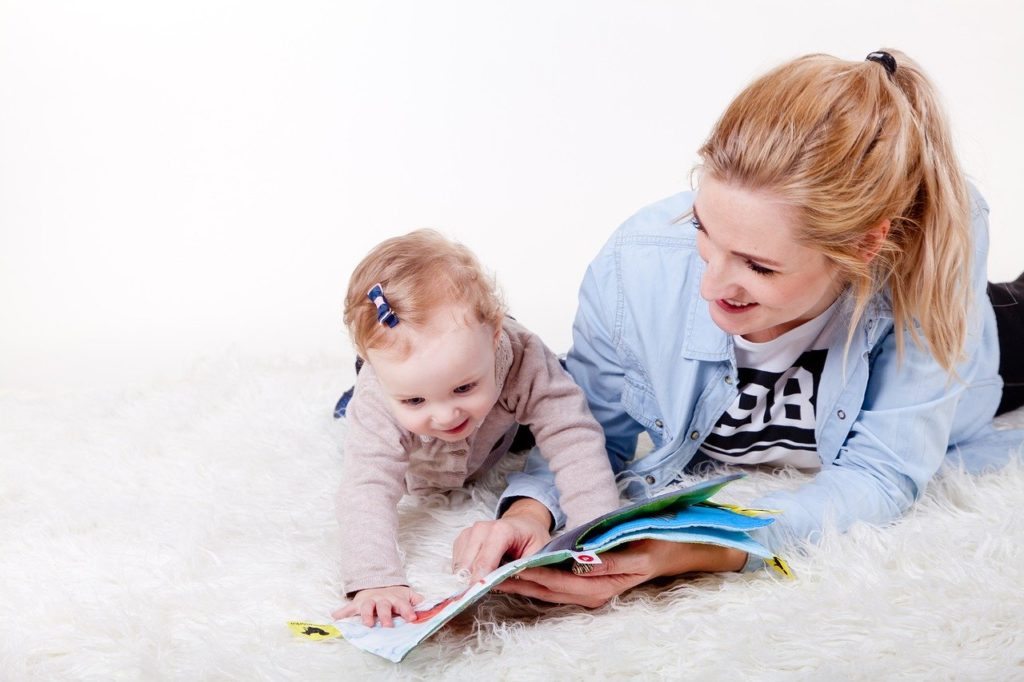 MRS: Very long time ago before I had even heard of TJEd, I tried many things to help with reading. The one thing I did right was listening to lots of books on tape. My son loved it. Nothing else I tried seem to be working. He loved story time and picked books that were above his age level for me to read. He hated the “reading time” and I thought he would never read. First book he read: The Harry Potter Series, Next Lord of the Ring series.
MRS: Very long time ago before I had even heard of TJEd, I tried many things to help with reading. The one thing I did right was listening to lots of books on tape. My son loved it. Nothing else I tried seem to be working. He loved story time and picked books that were above his age level for me to read. He hated the “reading time” and I thought he would never read. First book he read: The Harry Potter Series, Next Lord of the Ring series.
He still is a heavy audio book listener but he has an amazing reading ability regardless of what I tried before. All my efforts and programs did not have near as much affect as filling the house with good books that could be listened to while he played. Now I would recommend the Barton Program to go along with idea of filling the home with good books to listen too.
My youngest was my slowest to pick up the reading and struggled with the reading even more than the first and just this year everything started clicking and he is reading books now all the time. Barton is what helped me get the skills I needed to help him as he was trying but waiting for his brain to catch up. The rest was lots of great books to listen to and buy books that he wanted (they sat on the shelf until just recently).
I left books everywhere and picked up many audio books. Continued the pattern of listening together and reading aloud. And then suddenly he was reading. His first book on his own: The Mistborn series. Good phonics program made a big difference when the timing was right to help with the skills. Child went from struggling to read a large print 1/2 page story to the Mistborn series. The skills and practice just took off when it all clicked. We just did the Barton, slow and easy some days 10 minutes and other days not at all.
- LM: Thank u
- EKH: I had one son who did this and I realized he was reading whole magazine articles because of his conversations – I tested him by having him read a couple paragraphs from Harry Potter. I was amazed! he was only 4 and I had done 0 lessons about letters etc. he might have overheard brothers learning but I was unaware of it. (His older brothers watched ‘the letter factory’ a lot and liked doing things like making letters out of pretzel sticks) when he was only around 18mos old). I remember him pointing to the costco sign when he was 2 or 3 and saying ‘that says costco’ but I just assumed he had learned the sign said Costco but never thought he was reading it. One thing that made this especially surprising to me is that he was my one kid that never wanted to sit down and let me read to him.
HLC: I tell people that for my children, learning to read was like falling asleep. While there were plenty of signs that reading was coming, it was like it just happened one day! Our house is full of books and books are often the toys that are played with. I remember watching my oldest when she was five sit at a table with “Matilda” in front of her and when she was tired of playing she dog eared the page she was on! I have yet to have a five-year-old that could really read, but I don’t think any of them knew it at the time. Even my fourth child, when he was one, had a favorite book that he would take to each family member several times a day. He would back into their lap after handing them the book and wait for them to start reading.
One of my favorite family projects is the birthday cards we make for friends and family. We buy oversized paper from Walmart and write our message in gigantic letters. Then we color and decorate the letters. Doing this seems to make my children more familiar with the letters and more interested in writing. After making one such birthday card, my then four-year-old started writing down all the letters she had seen in the card. A week later she was writing her name.
As reading gets closer, my kids have always started recognizing letters out in the world. I think other mothers have mentioned stop signs as teaching tools. Seems like most of my kids learned the letter S first because of its recognizable shape and because of how often we see it on our trips outside of the home.
 KL: I read to him….a lot. He drew pictures and practiced writing individual letters. I took him to the library weekly and he chose books. He also played games on the computer that required him to read some. Through this process he started to sound out words and eventually started reading on his own. I frequently let him mispronounce words. I did not correct him. I just worked the words into what I was reading. He got them right after awhile.
KL: I read to him….a lot. He drew pictures and practiced writing individual letters. I took him to the library weekly and he chose books. He also played games on the computer that required him to read some. Through this process he started to sound out words and eventually started reading on his own. I frequently let him mispronounce words. I did not correct him. I just worked the words into what I was reading. He got them right after awhile.
CM: My first child was almost four and beginning to read small words when I read my first TJEd book. I finished the book in less than 24 hours and my position on homeschooling did a 180° overnight. When my husband woke up the next morning I greeted him with something like, “Holy Crow! I think we’re going to homeschool”.
I was lucky enough to attend a TJEd convention shortly after which cemented the idea of love of learning in my heart.
One thing we have always done well in our house is read. I love to read and I spent lots of time reading to my kiddos. My rule of thumb with reading to kids is that I typically only read books that I enjoy. Probably because I’m somewhat self-centered, I figure I can read books to the kids that I enjoy, or I can read books that I can’t stay awake through (Disney books anyone?), so I choose books that I enjoy because I know I will end up reading the same book ten times a day for weeks.
Anyway, I was delighted that # 1 was showing ability at a young age (it was easier to decide to homeschool when my child was so obviously brilliant : ).
Since she was starting to read I got hooked on phonics (because it’s so fun, right?). We created a reading nook with special pillows and a chart on the wall. The stipulation was that we would only read there when she was reading to me. (That hurts my heart a little to remember.)
Funny thing was, she hated that little nook and quickly decided she did not want to read. I felt like a failure, but remembered that my job was not to kill her love of learning, so I packed up the hooked on phonics and took down the chart. I went back to just reading to her.
We went through a similar experience every six months or so, until I finally got rid of the hooked on phonics and let it go. She started writing around 4 or 5. She would copy her books. I about had a heart attack the first time she brought me a page of sentences, until I read them and realized she had copied them out of a book. I had so much faith in her brilliance I was totally willing to believe she wrote a story. 🙂 And so we went on for years, reading picture books and then chapter books as a family. We memorized poetry, generally because we read it so often, not really on purpose. We played letter games and word games.
She publicly maintained her inability to read until she was about 8 yrs old. I was pretty certain she could read more than she was letting on, but she was completely unwilling to read anything without assistance. Shortly after she turned 8, she came to me and informed me that she could read. She knew this because she had read Huckleberry Finn. She is a type 2, with a very wide streak of type 4, and she tends to be very all or nothing. She claimed inability to read until she could read like me. : )
She is a slow and methodical reader. Once she has read something it tends to stay with her, but it takes forever for her to get through books. (I’m not a methodical reader : ) She is 14 and just transitioning to scholar phase.
After my experience with her, I was not excited to try to teach anyone to read, so I didn’t. Number two had zero instruction. I believe his first book was his cub scout book. The day he got it he stayed up all night reading it. I didn’t really believe he had read it, but we quizzed him and he had the book pretty well memorized. He is a very fast reader and commonly goes through a book or two a day. He’s 12 yrs old and toying with the idea of scholar phase.
My #3 has been my first to learn to read line-upon-line. At least, she’s the first to let me know about that part of her process. She didn’t learn over night. She started picking it up around the end of her 8th year, and surprised me in her desire for reading lessons. That was new, a kid who wanted reading lessons!
She can read anything in the scriptures, but stumbles in reading other books. We have been having snuggle time where we take turns reading. Her reading is getting more fluid and we are enjoying the time together. That happens about 3 times a week. She is just entering love of learning.
Our youngest decided to read just before 5, which was really weird because my current belief is that 8 is the year. He carries around he “learning to read book”, the McGuffey primer. He will sometimes horn in on his sister’s reading sessions and want his turn. It’s pretty cute to see him read, and we’ll keep having fun with it as long as it’s fun. The challenge with him is keeping it core phase appropriate, since I have no previous experience there, I worry about him getting too many accolades for the reading. But it’s so cute!
Anyway, I’m all for the lazy parenting method. Reading to my kids is fun. Making them do reading lessons is not. Why teach them something they can figure out?
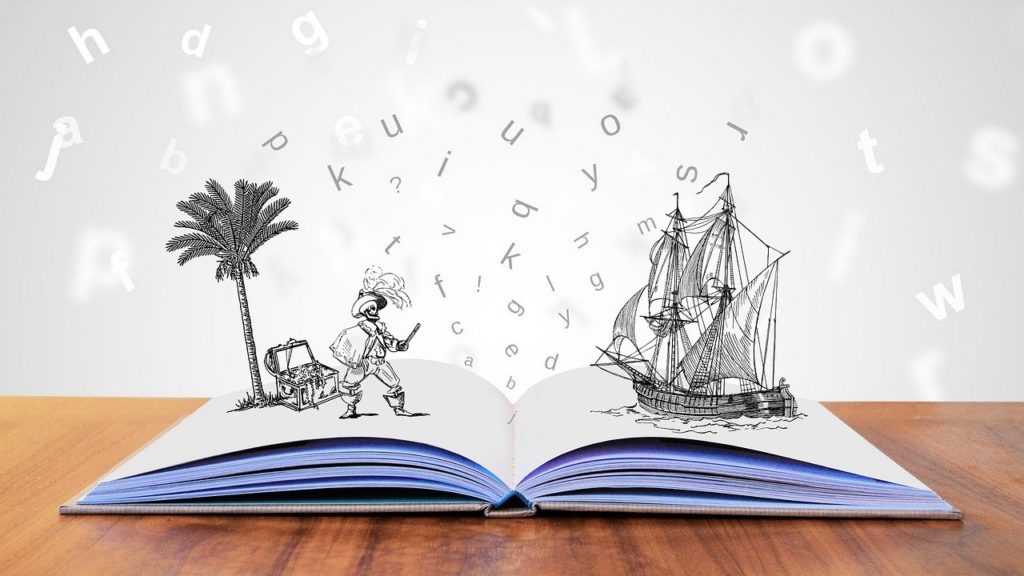 WS: We started with foam letters in the bath tub about 3 or 4 years old, and taught letter recognition first, then would ask what “sound’ it makes. Then we had them practice writing the letters starting with capitals then the lower case letters, (during Church or long driving trips)and then we started with the McOmber series books that use simple 2 and 3 letter words like “The cat sat on a mat” etc etc until they were learning all phonic sounds and moved to some Dr Seuss like One Fish Two Fish, and on from there…
WS: We started with foam letters in the bath tub about 3 or 4 years old, and taught letter recognition first, then would ask what “sound’ it makes. Then we had them practice writing the letters starting with capitals then the lower case letters, (during Church or long driving trips)and then we started with the McOmber series books that use simple 2 and 3 letter words like “The cat sat on a mat” etc etc until they were learning all phonic sounds and moved to some Dr Seuss like One Fish Two Fish, and on from there…
JJ: I have also found that an important part of learning to read for my oldest is her opportunity to teach it to her sisters. The bob books have been most helpful in this way also. She loves to play teacher, and I see her actually teaching true concepts and words.
- RHC: That works for us too. Sometimes I ask her to give a reading lesson to her younger brother with the secret purpose of her having some reading practice.
- JJ: YES!!! They feel like they are really contributing to the family all the while learning for themselves.
TSD: The other thing 5ds loves to do is word searches. He will sit for 20 minutes or more and seek out each word, letter by letter. We say the word and spell it out loud after he finds it. He doesn’t like the easy kid word searches anymore, he likes the older searches with bigger words. It all counts toward reading, at least in my book.
DK: Thank you for this post! I get it more than ever!
LM: Great to read..super inspiring!..
BA: My daughter (now 5) learned to read on her own at 3 years old. She has always loved books and being read to, and she has a great memory, especially when the words rhyme. We played rhyming games, talked about letter names and sounds with Leapfrog fridge phonics to reinforce the idea. We sang a little song to help her remember the letters in her name. When she got comfortable blending, we introduced some sight words, and she took off from there. Reading came earlier than most for her, but it really was almost effortless on my part.
 NJ: As I’m talking with my wife about this she told me that she taught about letter sounds and animal sounds together. Our alphabet blocks had letters, objects and sometimes animals. She didn’t really separate the difference between animals making sounds and letters making sounds. So the train says choo choo, the lion says roar and the s says ssss.
NJ: As I’m talking with my wife about this she told me that she taught about letter sounds and animal sounds together. Our alphabet blocks had letters, objects and sometimes animals. She didn’t really separate the difference between animals making sounds and letters making sounds. So the train says choo choo, the lion says roar and the s says ssss.
She also pointed out the other secret was that she was exhausted. So she let him have screen time, but “aimed for high quality educational material to keep the guilt from eating her alive.”
I will add that we naturally bring up educational topics and answer curiosity. On the other hand, he learned reading basics from starfall and letter factory, number basics from peg + cat, and a lot of emotional awareness from Daniel Tiger. We let the shows and games start conversations that we ask questions about later. This all helps us make sure they understand and can explain in their own words about the concepts.
I think people remember what they care about. If it is fun, kids will remember it with enough exposure whether it is good or bad.
OKAY: If you’ve made it this far, I’m going to go out on a limb and say that TJEd just might be a great fit for you.
What’s next:
If you haven’t seen the free 3-Video Series, I urge you to do so!

































Leave A Comment